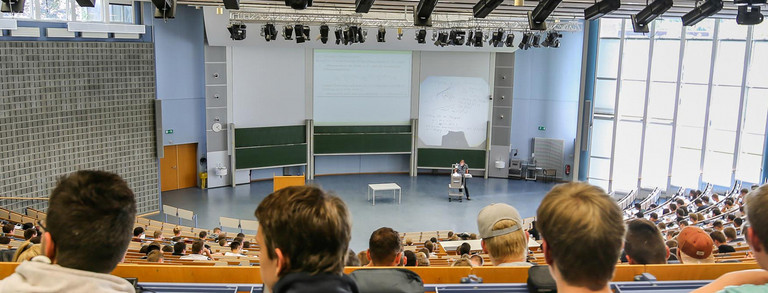Degree Programs from A to Z
The objective of the two-year Master’s degree program in Economics & Journalism is to train experts for economic policy practice. Accordingly, it targets outstanding economics graduates. It is also open to graduates of the B.A. in Economic Policy Journalism at TU Dortmund University.
to the degree program Economics and Journalism (Master of Arts (M.A.))
Students enrolled in the Bachelor’s degree program in Educational Sciences receive a solid basis for demanding, professional, theory and research-based work in education and social welfare. They acquire knowledge of the fundamental theoretical standpoints of educational research and gain specialist expertise through the study of a compulsory elective subject. In addition, they build up a portfolio of methodologies and concepts related to the professional field of educational research.
to the degree program Educational Sciences (Bachelor of Arts (B.A.))
The M.A. in Educational Sciences is a research-based Master’s degree program which prepares students for senior positions in various professional fields in education and for doctoral studies in the educational sciences.
to the degree program Educational Sciences (Master of Arts (M.A.))
The Bachelor’s degree program in Electrical Engineering and Information Technology deals with questions from a wide range of technical areas. These extend from energy conversion and transmission to automotive electronics, and from the development and processing of microchips to data communications.
In the dynamic field of electrical engineering and information technology, this Master’s degree program offers ideal preparation for employment in industry and research. Building on a broad education in the fundamentals, the students gain both comprehensive knowledge and the most up-to-date expertise. In addition, they learn skills and methods that enable them to carry out and evaluate engineering activities in a responsible manner and also equip them for the possibility of subsequently pursuing a doctoral degree in this field.
to the degree program Electrical Engineering and Information Technology (Master of Science (M.Sc.))
How can people acquire several languages at the same time or one after the other? What does multilingualism mean for an individual’s identity? And what is the impact of multilingualism on society and education policy? These are some of the questions tackled in the Master’s program in Empirical Multilingualism Research. It is run jointly by TU Dortmund University and Ruhr-Universität Bochum and deals with the various aspects of multilingualism – currently a hot topic in society. The program combines linguistics, language and philology and has a strong focus on empirical linguistics research.
to the degree program Empirical Multilingualism Research (Master of Arts (M.A.))
The Bachelor of Science in Industrial Engineering trains specialists for interdisciplinary tasks and promotes the potential of future managers. Accordingly, the Bachelor’s degree program itself is interdisciplinary, in that the departments of Business and Economics, Electrical Engineering and Information Technology, and Mechanical Engineering all particiate in close collaboration. Training at TU Dortmund University is very practice-oriented and makes it possible to deepen theoretical knowledge through laboratory sessions and internships.
to the degree program Industrial Engineering (Bachelor of Science (B.Sc.))





![[Translate to English:] Partner Four hands are holding the green logo of TU Dortmund University](/storages/tu_website/_processed_/1/d/csm_Partner_Nicole_Rechmann_KW_670eba0154.jpg)




![[Translate to English:] Forschung An apparatus with tubes in a laboratory](/storages/tu_website/_processed_/0/c/csm_Forschung_Juergen_Huhn_4fa3153b51.jpg)
![[Translate to English:] Studium Five students are sitting in a lecture hall. They are talking to each other.](/storages/tu_website/_processed_/c/9/csm_Studium_FelixSchmale_dbdbfb0dd7.jpg)





